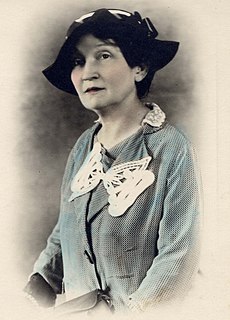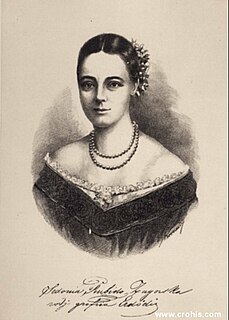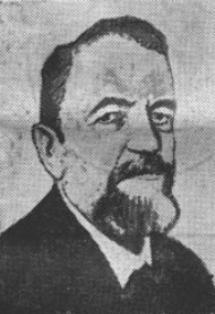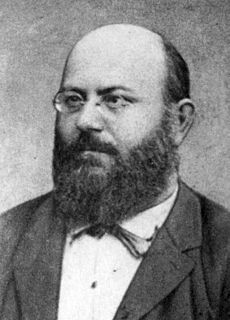 W
WKoloman Bedeković was a Croatian politician, who served as Minister without portfolio of Croatian Affairs twice: between 1868–1871 and between 1876–1889. He had significant role in the creation of Croatian-Hungarian Agreement. In 1871 he was appointed Ban of Croatia-Slavonia.
 W
WJelica Belović-Bernadzikowska was a Serbian ethnographer, journalist, writer, and feminist. She wrote literary works for children and educational discussions. As a journalist, wrote theater and music criticism, and published works on handicrafts and folk costumes. She wrote for and was the editor of the first Serbian women's magazine. She wrote under multiple pseudonyms, including Ljuba T. Daničić, Hele, Jelica, Jele, Jasna, Aunt Jelica, and young lady Ana.
 W
WValtazar Bogišić was a Serbian jurist and a pioneer in sociology.
 W
WBela Čikoš Sesija was a Croatian Symbolist painter, art teacher and one of the founders of the Academy of Fine Arts in Zagreb.
 W
WMenci Clement Crnčić was a Croatian painter, printmaker, teacher and museum director. He studied painting and drawing in Vienna and Munich, and trained in graphic arts in Vienna, studying etching and engraving. He was the first artist in the Croatian graphic tradition to abandon a strictly linear style and use tonal variation to create contrasting areas of light and shade.
 W
WAnton Csorich was a Croatian nobleman and general in the Habsburg Monarchy imperial army service. He was titled baron of Monte Creto and promoted to the position of lieutenant field marshal when he became second chief of the 15th Infantry Regiment. In that position he took part in the suppression of the October 1848 uprising in Vienna. He then went on to participate in the Austrian war against the Hungarian State in 1849.
 W
WJanko Drašković was a Croatian national reformer, politician and poet. He was a member of the Drašković family, one of the oldest Croatian noble families.
 W
WVinko Dvořák was a Czech-Croatian physicist, professor and academician.
 W
WJosip Filipović, Freiherr (Baron) von Philippsberg, also Josef von Philippovich or Joseph Philippovich, was an Austro-Hungarian general (Feldzeugmeister).
 W
WVlaho Getaldić was a Dalmatian writer, translator and politician from Dubrovnik.
 W
WDragutin Gorjanović-Kramberger was a Croatian geologist, paleontologist, and archeologist.
 W
WDragojla Jarnević, 12 was a Croatian poet and teacher. She became a member of the Illyrian movement, being most famous for writing of women's rights issues. She is also known for being an early mountaineer and rock-climber, famous for scaling the rock of Okić.
 W
WBaron Franjo Jelačić Bužimski was a Croatian nobleman, a member of the House of Jelačić. He began his service in the Habsburg army as a Grenz infantry officer and fought against the Ottoman Turks. During the French Revolutionary Wars he received promotion to the rank of general officer and won an outstanding victory at Feldkirch. His later career proved that his martial abilities were limited. He twice led independent division-sized forces in the Napoleonic Wars, with unhappy results. He was Proprietor (Inhaber) of an Austrian infantry regiment from 1802 until his death.
 W
WCount Josip Jelačić von Bužim was a Croatian lieutenant field marshal in a Imperial-Royal Army and politician, the Ban of Croatia between 23 March 1848 and 19 April 1859. He was a member of the House of Jelačić and a noted army general, remembered for his military campaigns during the Revolutions of 1848 and for his abolition of serfdom in Croatia.
 W
WStjepan Jovanović was a military commander of the Austrian Empire from the Military Frontier.
 W
WVinko Knežević or Vincent Knesevich of Saint Helen ; 30 November 1755 – 11 March 1832) was a Croatian nobleman and general in the Habsburg Monarchy imperial army service. He was a member of the Knežević noble family. During his long military career he fought in many battles during the Austro-Turkish War and the French Revolutionary Wars. In 1799 he led a hussar regiment at Cassano, the Trebbia and Novi. He commanded an infantry brigade at Marengo the following year and led Austrian Empire troops in the Tyrol in 1805 and at Graz in 1809. He served in various assignments on the Military Border from 1809 to 1812. From 1802 he lived on his estate Sveta Jelena in former Zala County, modern-day Međimurje County in northern Croatia. By the end of Napoleonic Wars he retired from military service as a General der Kavallerie in 1815. He became Proprietor of a dragoon regiment in 1809 and held that office until his death in 1832.
 W
WKároly Knezić was a honvéd general in the Hungarian Army. On his father's side he had Croatian roots, while his mother was a Hungarian. He was executed for his part in the Hungarian Revolution of 1848, and is considered one of the 13 Martyrs of Arad.
 W
WThe Mayor of the City of Split, colloquially the Poteštat, is the highest official of the Croatian city of Split. From 1990 to 2007 the mayor was elected by the city assembly. Since 2007 Croatian mayors are elected directly by the citizens. The first such election in Split occurred in 2009.
 W
WJoseph Freiherr Maroicic von Madonna del Monte was an Austrian general of Croatian descent.
 W
WDora Pejačević was a Croatian composer, a member of the Pejačević noble family. She was one of the composers to introduce the orchestral song to Croatian music and her Symphony in F-sharp minor is considered by scholars to be the first modern symphony in Croatian music.
 W
WCount Petar Pejačević of Virovitica was a Croatian politician, who served as Hungarian Minister without portfolio of Croatian Affairs between 1871 and 1876. He was a member of the Ruma-Retfala branch of the Pejačević noble family.
 W
WJosep Pliverić was a Croatian lawyer, university professor, theorist of the Croatian state law and a Member of Croatian Parliament. Pliverić was rector of the University of Zagreb in the academic years 1892/1839 and 1904/1905, a professor at the Faculty of Law, member of the Croatian Parliament from 1892 until 1906 and elected Croatian member of the Diet of Hungary in Budapest.
 W
WPetar Preradović was a Croatian poet, writer, and military general. He was one of the most important Croatian poets of the 19th century Illyrian movement and the main representative of romanticism in Croatia.
 W
WKarlo Pavao Gvozdanović was a Croatian nobleman and general in the Habsburg Monarchy imperial army service. He achieved the rank of major general and was awarded the Knight's Cross of the Military Order of Maria Theresa in 1801 and the Commander's Cross of the same order of merit in 1814.
 W
WAntun Radić was a Croatian scientist, writer, translator, journalist, sociologist, ethnographer and politician. He is the founder of Croatian ethnography.
 W
WPavle Radić was a Croatian politician and member of the Croatian People's Peasant Party (HPSS).
 W
WStjepan Radić was a Croatian politician and founder of the Croatian People's Peasant Party (HPSS).
 W
WThe Mayor of the City of Split, colloquially the Poteštat, is the highest official of the Croatian city of Split. From 1990 to 2007 the mayor was elected by the city assembly. Since 2007 Croatian mayors are elected directly by the citizens. The first such election in Split occurred in 2009.
 W
WToma Rosandić was a Yugoslav sculptor, architect and fine arts pedagog. Together with Ivan Meštrović (1883–1962), he was the most prominent of Yugoslav sculptors of his day.
 W
WCountess Sidonija Rubido Erdődy (1819–1884) was Croatia's first opera primadonna and an important member of the Illyrian movement.
 W
WMathias Rukavina von Boynograd, also Mathias Rukawina, Mathias Ruccavina, Mate Rukavina, was a Croatian general in the Habsburg Monarchy imperial army service. He joined the army in 1755 and fought against the Kingdom of Prussia, Ottoman Turkey, and the First French Republic. For most of his career he served with the light infantry from the military border with Turkey. He earned the rank of general officer during the French Revolutionary Wars, distinguishing himself at Loano. During the 1796 Italian campaign, he commanded a brigade in several battles against the French army led by Napoleon Bonaparte. He was Inhaber (Proprietor) of an Austrian infantry regiment in 1803–1804.
 W
WStephan Schulzer von Müggenburg was a Hungarian – Croatian army officer and mycologist. His first name is variably spelled Stefan Stjepan or István.
 W
WJosip Šilović was a Croatian jurist and university professor who served as a rector of the University of Zagreb, member of the Croatian Parliament, senator in the Parliament of Yugoslavia and first Ban of the Sava Banovina.
 W
WAnte Starčević was a Croatian politician and writer. His policies centered around Croatian state law, the integrity of Croatian lands, and the right of his people to self-determination. As an important member of the Croatian parliament and the founder of the Party of Rights he has laid the foundations for Croatian nationalism. He has been referred to as Father of the Nation due to his campaign for the rights of Croats within Austria-Hungary and his propagation of a Croatian state in a time where many politicians sought unification with other South Slavs. Some of his works and viewpoints, viewed by some historians as racist and Anti-semitic, served as tenets of Ustaše movement which has made him a controversial figure.
 W
WDavid Starčević (1840–1908) was Croatian politician and prominent member of the Party of Rights.
 W
WJuro Tkalčić was a Croatian cellist and composer.
 W
WBaron Josef Philipp Vukassovich was a Croatian soldier who joined the army of Habsburg Monarchy and fought against both Ottoman Empire and the First French Republic. During the French Revolutionary Wars, he commanded a brigade in the 1796–1797 Italian campaign against Napoleon Bonaparte. He led a division during the Napoleonic Wars and received a fatal wound in action.
 W
WJanko Vuković, sometimes spelt Janko Vukovich or von Vukovich, also known as Janko Vuković de Podkapelski or Janko Vuković-Podkapelski was a Croatian naval officer who served in the Austro-Hungarian Navy and for a brief period as commander-in-chief of the navy of State of Slovenes, Croats and Serbs. Vuković saw action in World War I and was appointed commander of the fleet in October 1918 as the Austria-Hungary disintegrated and the entire navy was handed over to the fledgling State of Slovenes, Croats and Serbs. He died on board the SMS Viribus Unitis, sunk by Italian commandos.